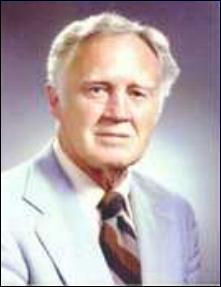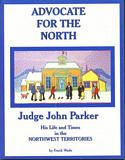More about Tony Gregson from Frank Wade's
"Advocate For The North - Judge John
Parker"

Judge
John Parker was a northern lawyer, politician and later a
judge who traveled widely in his practice. Described as a
man of humor and humanity; a visionary and sparkplug, Parker
was a fiery speaker who came straight to the point,
sometimes upsetting the establishment. When elected to the
Northwest Territorial Council, he spoke out about the
dreadful conditions of the native population. He predicted
nothing but good for the future of the north.
"Parker was involved in another rather
odd Yellowknife case which could be called the "Stolen gold
Bars Case." His involvement, however, was not as central as
he might have wished. The case concerned a young Australian
miner called Tony Gregson. he was a happy-go-lucky character
who seemed well-educated, and was certainly athletic,
handsome, gregarious, and popular. A well-paid single miner,
he was never short of cash or charm, and cut quite a swath
through the ladies of the town.
He worked in Yellowknife before
moving to Consolidated Discovery Mine, some sixty miles to
the north and only accessible by bush plane or winter Cat
train. After a year or so there, he informed the mine
manager that he was moving on. This was normal for single
men at remote mines. They could save a lot of money in a
short time, since there was nowhere to go and nothing to
spend it on...provided they didn't lose it all in gambling.
Also, they would become bored and want to seek greener
pastures. The manager expressed his regrets and assured
Gregson that a job would be waiting for him if he decided to
come back.
When he was collecting his last check,
the accountant told him about a small group insurance refund
and asked where he wanted it sent. Tony had no intention of
giving a forwarding address and replied, "Oh, send the check
to the Vancouver Symphony Orchestra as a contribution from
me."
Shortly after this, an insurance
company contacted Parker and asked him if he would act on
its behalf. It wanted him to find out about the
circumstances of the theft and advise whether there had been
negligence on the part of the carriers, and, if so, whether
a suit could be launched against them. He refused because
both Max Ward and Emil Lamoureux were old friends and
clients.
From time to time reports were
received that Gregson had been seen by people from the
Territories while they were away on holiday or on business,
but no one turned him in. One friend encountered him in
Detroit and Tony expressed pleasure at seeing him. He
suggested a drink at the Book-Cadillac Hotel in half an
hour, but never turned up.
On June 27, 1957, three years later,
the News of the North included an item that Gregson had been
caught in Sydney, Australia. He had been reported as a
stowaway by the captain of the SS Cornwall. Later it was
revealed that he had given the police a false name. However,
after routine finger-printing, the police, still on the
alert for him, discovered his real name. With some smart
detective work, his print was matched to his name on an
Interpol listing, which stated that he was wanted in Canada
for the theft of gold bars. He was locked up and the RCMP
were notified.
He was extradited within a month and
returned to Halifax by ship in the charge of a Canadian
immigration officer. He said he could have escaped from the
ship at Fiji, but had given his word and decided to return
to Canada to face the music. He was met by Corporal Bill
Campbell of the Yellowknife RCMP and said with his usual
aplomb, "Hello Bill, nice of you to come."
On his return to Yellowknife, the
Department of Justice asked Parker to prosecute the case,
but he refused, since he expected to be asked to act for the
defendant. The thought of carving a defense out of what he
knew of the case intrigued him. However, Gregson retained
Don Hagel. Maybe he thought Parker would refuse because he
was such a good friend of Max Ward.
Much to Parker's surprise, Gregson
pleaded guilty and Judge Sisson's sentenced him to
twenty-eight months and he was paroled after eighteen
months. No mention was made of the disposition of the gold
and it was never recovered.
Parker was hired by the mine's
insurance company to conduct a watching brief. he was to sit
in court, listen to the proceedings, and inform his clients
of anything that might interest them. Parker later
discovered what had happened to Gregson during his three
year absence. His first problem was to sell the gold bars
without arousing suspicion. Certainly it was too dangerous
to attempt this in Canada and the States. He eventually
learned that Cuba would be the best place. After he arrived
on the island, he cut a big chunk off one bar and had little
trouble in finding a willing purchaser after a casual
conversation in a bar. After a fling on the island, he
returned to Nova Scotia, presumably using a false passport.
Here he purchased a small boat and went into the fishing
business in a small Nova Scotia fishing port. He hired a
young man to help him.

One day his landlady came to his room
saying that two RCMP officers wanted to see him. Fearing the
worst, he adopted his usual jovial manner and came down to
talk to them. he still had one gold brick and part of
another in a locked suitcase in his room upstairs. They
apologized for bothering him but wanted to know something
about the man who was working for him.
After this close brush with the law,
he decided to sell the boat and return to Cuba. Here he went
through his ill-gotten gains at a fast rate because within
two years or so, he got into difficulty with the Cuban
authorities and was ordered to leave. he was forced to
stowaway on a ship, in Cuba and elsewhere, to get back home
to Australia. There was talk that he spent, lost, or was
forced to give up what was left of his gold bars and so
became a penniless destitute. So much then for the colorful
tale of Tony Gregson."
Top
Back